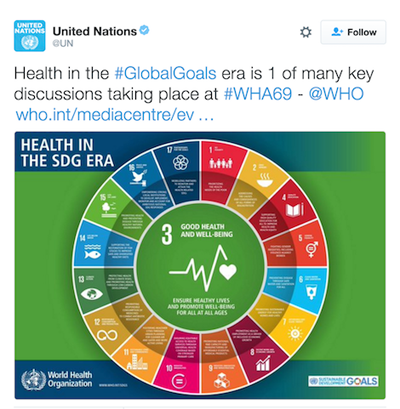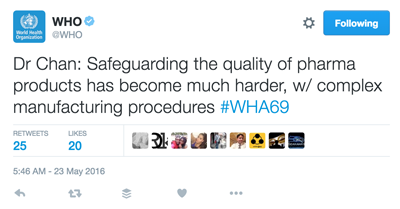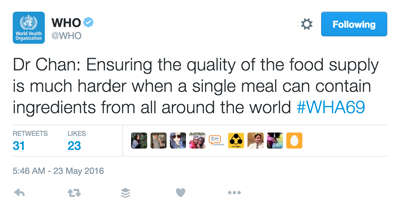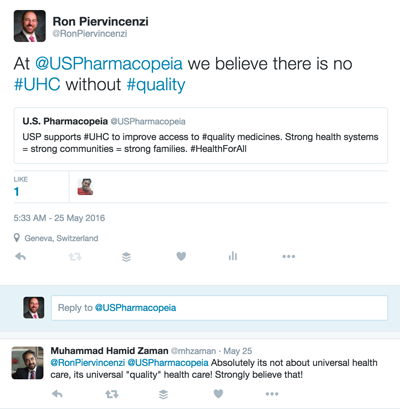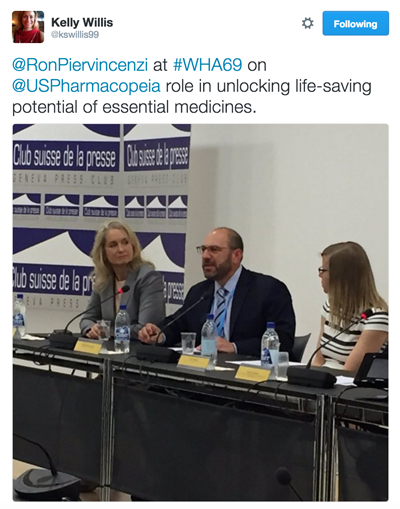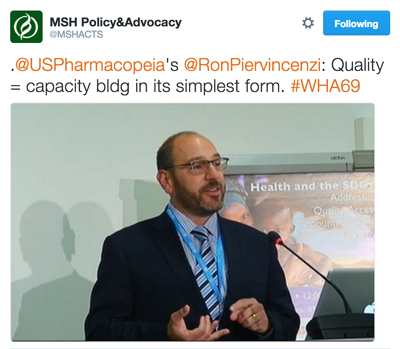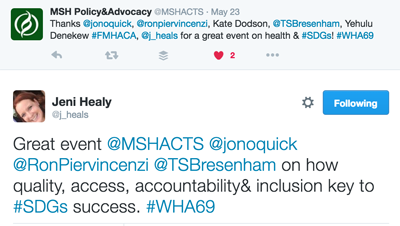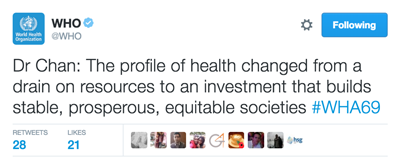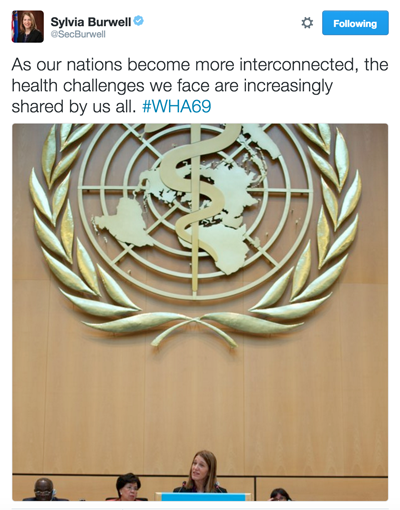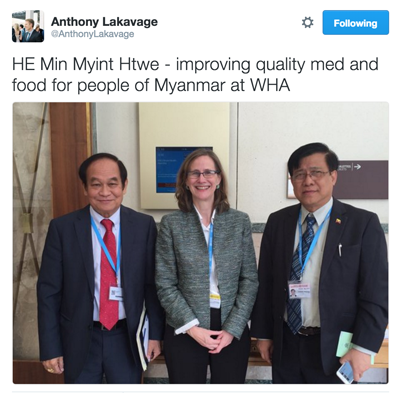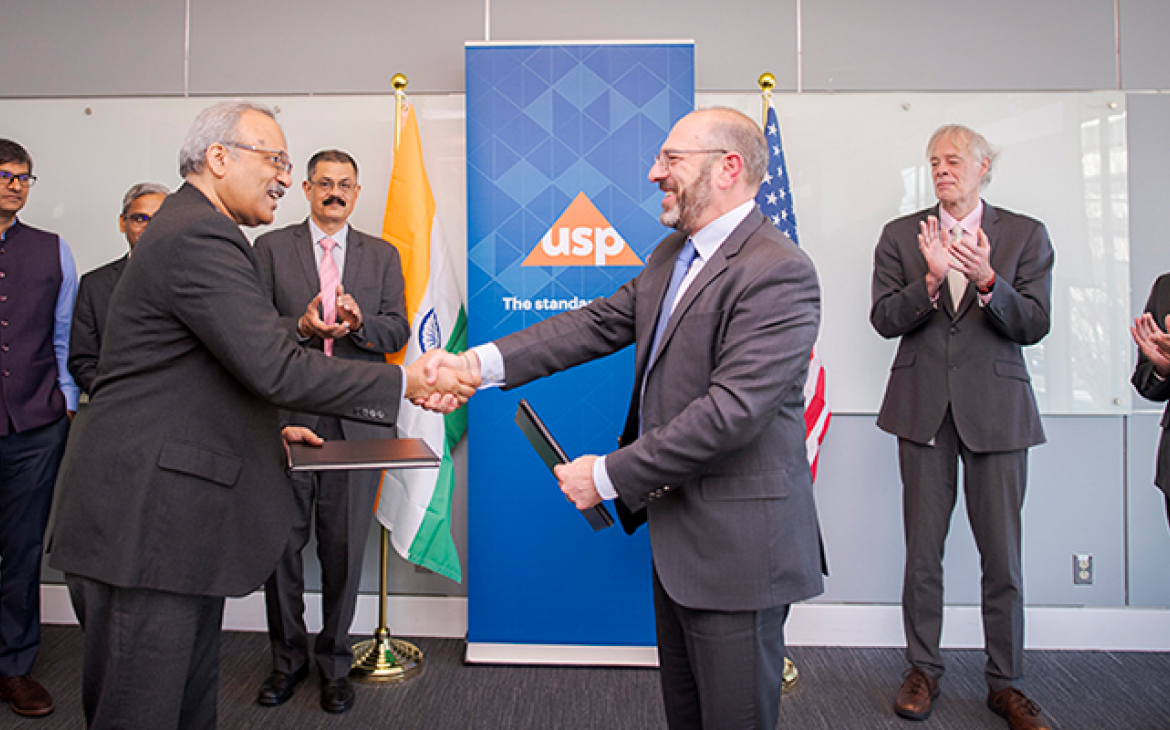Last week, the world turned its focus to issues of global public health as the 69th World Health Assembly (WHA) got underway. USP leaders were among some 3500 delegates who gathered in Geneva, Switzerland to attend the plenary sessions, as well as myriad side events. In today’s interconnected world – these conversations extended beyond Geneva via social media and USP leaders were part of that conversation as well.
This year’s WHA was the first since the September 2015 United Nations Summit, when world leaders adopted a set of 17 Sustainable Development Goals (SDGs). The SDGs apply to all countries and are a diverse set of broad goals to be achieved by 2030. Among the targets: end poverty, fight inequality and injustice, tackle climate change and ensure good health.
WHO Director-General Dr. Margaret Chan opened the meeting with words of celebration – touting the progress in global public health made since the adoption of the Millennium Development Goals.
USP is proud to have contributed to the significant strides the global health community has made. Childhood mortality rates have been reduced by more than half, HIV and AIDS is considered a manageable chronic disease, fewer women die in childbirth each year than ever before and there have been significant advances combatting malaria and polio as well. Many of these advances would not have been possible without significant capacity building, health systems strengthening, and improvements in quality assurance and quality control.
Despite these advances, Dr. Chan and many others warned that as we enter the Sustainable Development Goal era, the world still faces significant health challenges and stressed that these challenges are shared by us all.
She also pointed to recent outbreaks of Ebola, MERS coronavirus, Zika and urban yellow fever as signaling a “dramatic resurgence of the threat from emerging and re-emerging infectious diseases” and reminded attendees that these pathogens travel well internationally in people, animals and food.
Dr. Chan spoke to the challenges of our increasingly global supply chains for both pharmaceuticals and foods.
To protect advances in global health and to support SDG, Goal 3 – “Ensure healthy lives and promote well-being for all at all ages” – we need to ensure access to safe, effective, quality and affordable essential medicines and vaccines. This was the focus of a side event hosted by USP together with Management Sciences for Health (MSH) and Dentons.
Access to quality assured medicines is an essential part of achieving Target 3.8, Universal Health Coverage. During WHA week, USP announced its support for Universal Health Coverage and our decision to join a global coalition in support of this important goal.
For Universal Health Coverage to be effective, patients and practitioners need to be confident that medical products are what they are purported to be and that they will deliver the therapeutic effects they are supposed to. Quality standards are what make this possible.
Under well-established regulatory systems, quality-related requirements for medicines go hand-in-hand with public expectations for, and confidence in, drug quality. Unfortunately, many lower and middle income countries have weak regulatory systems and poor manufacturing processes that result in poor quality medicines. Poor quality medicines can lead to adverse events, inadequate treatment, therapeutic failure, drug resistance, and ultimately a breakdown in trust in the health system more generally.
For example, during the event, one of the panelists, Mr. Yehulu Denekew Director General, Food, Medicine and Health Care Administration and Control Authority of Ethiopia, spoke about his nation’s advances in getting women to deliver babies with professional medical assistance. Dr. Ron Piervincenzi underscored the importance of quality to health care by pointing to a PQM/USP study of uterotonic drugs in Ghana found that a shocking 90% of drugs sampled – even those on the shelves of medical clinics – were substandard, non-sterile or both.
The health of women, children and adolescents was a particular focus of the WHA. Delegates committed to forward a strategy to ensure every woman, child and adolescent, in any setting, anywhere in the world, is able to both survive and thrive by 2030. The strategy places a strong emphasis on country leadership, accountability through monitoring and data collection as well as strengthening health systems and building partnerships across different sectors.
During the event, USP highlighted how quality standards are an essential component of public health because they underpin countless decisions and processes. Quality standards provide a scientific basis for decision-making in regulatory review, manufacturing and enforcement. Quality standards contribute to research and development, facilitate competition, and makes medicines more affordability and accessible.
Another issue highlighted by Dr. Chan and many others is the global public health threat posed by Antimicrobial resistance (AMR.)
AMR threatens to undermine the Target 3.d to strengthen capacity for early warning, risk reduction, and management of national and global health threats.
Substandard drugs are often diluted and can contribute to sub-therapeutic treatment. Among the multitude of factors contributing to AMR – such as over-prescribing of drugs and poor adherence to treatment regimens - the role played by substandard and falsified medicines is preventable. Allowing poor quality drugs to prevail anywhere threatens the long term effectiveness of efficacious drugs everywhere.
USP stressed the importance of including drug quality assurance as part of concerted and comprehensive plans for fighting the emergence of AMR.
Although much of the focus was on SDG 3, USP also pointed to ways that quality assured medical products are necessary to achieve many of the other SDG targets such as: ending epidemics, reducing non-communicable diseases, reducing maternal mortality, ending preventable deaths of newborns and under-five children, and reducing deaths and illnesses from hazardous chemicals.
Speaking of the global nature of both the health threats and our health systems and supply chain, Dr. Chan reminded attendees that “Few health threats are local anymore. And few health threats can be managed by the health sector acting alone.” Global collaboration and public-private partnerships will be necessary to achieve the SDG goals and that will require investment by all.
Each country should have a regulatory system that can protect and promote public health, and should also be able to rely on other countries and systems through work-sharing and other approaches such as risk-based allocation of resources.
USP is a global leader in the collaborative partnerships necessary to support these efforts. WHA69 was also an opportunity for USP to meet with many of our global partners and renew or strengthen our relationships.
During WHA week, USP explored new areas of collaboration with established partners.
USP also identified new partnership opportunities with countries, like Myanmar, that are eager to enhance their regulatory authority.
USP staff met with representatives from countries in Africa, South America and Asia while in Geneva to discuss collaboration. Woven together, these partnerships strengthen national systems and regional cooperation and thereby strengthen the global product safety net; which is a necessary development if we are to achieve the Sustainable Development Goals, establish Universal Health Coverage and combat the global threat of Antimicrobial resistance.
Click here to watch recording of the full event.
This conversation will continue through 2030 as together the world works to achieve the SDGs. You can join the conversation at USP or online.
